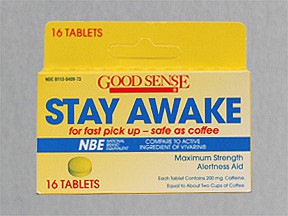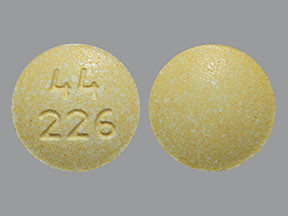CAFFEINE - ORAL
PHONETIC PRONUNCIATION: (KAF-een)
COMMON BRAND NAME(S): No Doz, Stay Awake, Vivarin
GENERIC NAME(S): caffeine
Uses
USES: This medication is used occasionally to help you stay awake and alert when you are feeling tired and/or drowsy. Caffeine is a mild stimulant. This medication should not be used to replace sleep. This medication should not be used in children younger than 12 years old.
How to use CAFFEINE - ORAL
HOW TO USE: Take this product by mouth as directed. Follow all directions on the product package, or take as directed by your doctor. If you are uncertain about any of the information, consult your doctor or pharmacist. This medication should only be used as needed, not on a regular basis. Though very unlikely, this medication may be habit-forming. Do not increase your dose, take it more frequently than directed, or take it regularly for a long time. This medication may cause withdrawal reactions, especially if it has been used regularly for a long time or in high doses. In such cases, withdrawal symptoms (such as headaches, mental/mood changes such as irritation/nervousness) may occur if you suddenly stop using this medication. To prevent withdrawal reactions, your doctor may reduce your dose gradually. Consult your doctor or pharmacist for more details, and report any withdrawal reactions right away. When used for an extended period, this medication may not work as well. Talk with your doctor if this medication stops working well. Tell your doctor if your condition persists, worsens, or continues to occur again. If you think you may have a serious medical problem, seek immediate medical attention.
Side Effects
Precautions
Interactions
Overdose
Images
Reviews
Faq for CAFFEINE - ORAL
Caffeine is a natural stimulant found in various plants, such as coffee beans, tea leaves, and cocoa beans. It is also a common ingredient in many beverages, foods, and medications.
Caffeine works by stimulating the central nervous system, blocking adenosine receptors in the brain. This helps in increasing alertness, reducing fatigue, and improving concentration.
Coffee, tea, energy drinks, soft drinks (sodas), chocolate, and some medications (like pain relievers and cold medicines) commonly contain caffeine.
According to the FDA, moderate caffeine consumption (up to 400 milligrams per day) is generally considered safe for most healthy adults. However, individual sensitivities and tolerance levels may vary.
Consumption of excessive caffeine can lead to side effects such as insomnia, restlessness, nervousness, increased heart rate, digestive issues, muscle tremors, and dependency or addiction.
While caffeine has a slight diuretic effect, moderate caffeine intake does not significantly contribute to dehydration. However, excessive consumption or consuming caffeine in the form of highly concentrated drinks may have a mild dehydrating effect.
It is generally recommended that children and teenagers limit their caffeine intake. The American Academy of Pediatrics suggests that adolescents should consume no more than 100 milligrams of caffeine per day from all sources.
Yes, caffeine can be addictive. Regular consumption of caffeine can lead to physical and psychological dependency, causing withdrawal symptoms like headaches, irritability, and fatigue when it is abruptly discontinued.
Moderate caffeine intake during pregnancy (up to 200-300 milligrams per day) is generally considered safe, but higher amounts may increase the risk of miscarriage or preterm birth. It is advisable to consult with a healthcare professional for specific recommendations.
Yes, caffeine can interact with certain medications, both prescription and over-the-counter. It may enhance or reduce the effects of certain drugs, so it is important to check with a healthcare professional or read medication labels for any warnings or precautions regarding caffeine consumption.
Disclaimer
IMPORTANT: HOW TO USE THIS INFORMATION: This is a summary and does NOT have all possible information about this product. This information does not assure that this product is safe, effective, or appropriate for you. This information is not individual medical advice and does not substitute for the advice of your health care professional. Always ask your health care professional for complete information about this product and your specific health needs.



No Reviews Yet